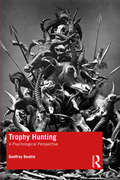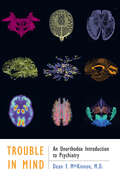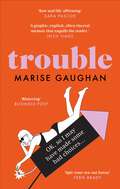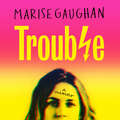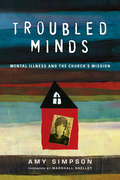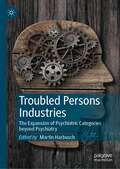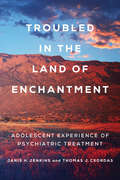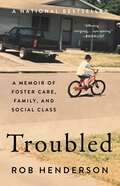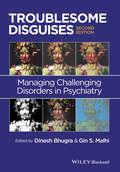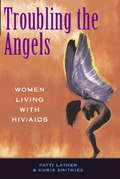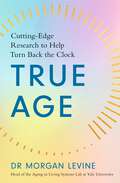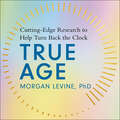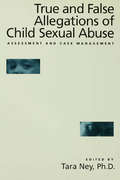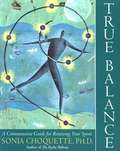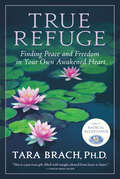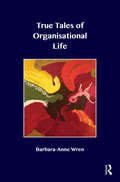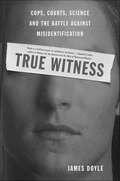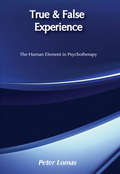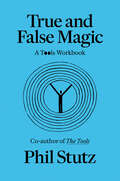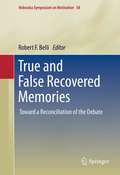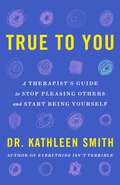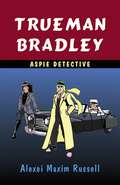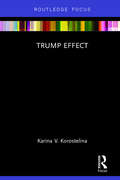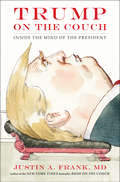- Table View
- List View
Trophy Hunting: A Psychological Perspective
by Geoffrey BeattieThis book explores the psychology of trophy hunting from a critical perspective and considers the reasons why some people engage in the controversial activity of killing often endangered animals for sport. Recent highly charged debate, reaching a peak with the killing of Cecil the lion in 2015, has brought trophy hunting under unprecedented public scrutiny, and yet the psychology of trophy hunting crucially remains under-explored. Considering all related issues from the evolutionary perspective and ‘inclusive fitness’, to personality and individual factors like narcissism, empathy, and the Duchenne smiles of hunters posing with their prey, Professor Beattie makes connections between a variety of indicators of prestige and dominance, showing how trophy hunting is inherently linked to a desire for status. He argues that we need to identify, analyse and deconstruct the factors that hold the behaviour of trophy hunting in place if we are to understand why it continues, and indeed why it flourishes, in an age of collapsing ecosystems and dwindling species populations. The first book of its kind to examine current research critically to determine whether there really is an evolutionary argument for trophy hunting, and what range of motivations and personality traits may be linked to this activity. This is essential reading for students and academics in psychology, geography, business, environmental studies, animal welfare as well as policy makers and charities in these and related areas. It is of major relevance for anyone who cares about the future of our planet and the species that inhabit it.
Trouble in Mind: An Unorthodox Introduction to Psychiatry
by Dean F. MacKinnonOrthodox psychiatric texts are often rich in facts, but thin in concept. Depression may be defined as a dysfunction of mood, but of what use is a mood? How can anxiety be both symptom and adaptation to stress? What links the disparate disabilities of perception and reasoning in schizophrenia? Why does the same situation push one person into drink, drugs, danger, or despair and bounce harmlessly off another? Trouble in Mind is unorthodox because it models adaptive mental function along with mental illness to answer questions like these. From experience as a Johns Hopkins clinician, educator, and researcher, Dean F. MacKinnon offers a unique perspective on the nature of human anguish, unreason, disability, and self-destruction. He shows what mental illness can teach about the mind, from molecules to memory to motivation to meaning.MacKinnon’s fascinating model of the mind as a vital function will enlighten anyone intrigued by the mysteries of thought, feeling, and behavior. Clinicians in training will especially appreciate the way mental illness can illuminate normal mental processes, as medical illness in general teaches about normal body functions. For students, the book also includes useful guides to psychiatric assessment and diagnosis.
Trouble: A memoir
by Marise Gaughan***'Raw, brutal and life-affirming - Marise has written a hugely important book that is as entertaining as it is illuminating.' - Sara Pascoe'I couldn't put this down. A brave, honest, witty, new Irish voice that has a very bright future ahead of her.' - Jade Jordan'Holy cow. I finished it and cried my eyes out. An incredible, beautifully written memoir about humanity, heartbreak and hope.' - Lou Sanders'Gripping, funny and heart-wrenchingly relatable. Every time I turned the page I hoped it wouldn't be the last.' - Lily O'Farrell, Vulgadrawings'Where so much writing about mental illness is riddled with po-faced earnestness and cliche, Marise Gaughan's take no prisoners approach to craziness, sex and Catholic girlhood is spit-your-tea-out funny.' - Fern Brady'Disarming in its candour, hilarious and harrowing in its depictions of a life shaped by trauma and addiction, reminds us that we are not defined by our pasts, but by the small steps we take every day towards our ideal selves.' - Stephen Kelman, Booker Prize-shortlisted author of Pigeon English'A knife-sharp and defiant story of recovery' - Tanya Shadrick, author of The Cure for SleepMarise was nine when she first realised there was trouble, 14 when her Dad tried to end it all, and 23 when he finally succeeded.In a turmoil of conflicting emotions Marise runs - from Dublin to Amsterdam to Los Angeles, leaving a trail of sex and self-destruction in her wake. Until finally, she finds herself facing what she's become in a California psych ward, a girl imploding through trying to make sense of her father's suicide.As she retells her unravelling, from child to adult, Marise strips back her identity and her relationship with her father, layer by layer, until she finally starts to understand how to live with him, years after he has gone.Written beautifully, with wit and unflinching honesty, Marise has produced one of the most powerful coming-of-age memoirs of recent years, a brave new voice in Irish writing.
Trouble: A memoir
by Marise Gaughan***'Raw, brutal and life-affirming - Marise has written a hugely important book that is as entertaining as it is illuminating.' - Sara Pascoe'I couldn't put this down. A brave, honest, witty, new Irish voice that has a very bright future ahead of her.' - Jade Jordan'Holy cow. I finished it and cried my eyes out. An incredible, beautifully written memoir about humanity, heartbreak and hope.' - Lou Sanders'Gripping, funny and heart-wrenchingly relatable. Every time I turned the page I hoped it wouldn't be the last.' - Lily O'Farrell, Vulgadrawings'Where so much writing about mental illness is riddled with po-faced earnestness and cliche, Marise Gaughan's take no prisoners approach to craziness, sex and Catholic girlhood is spit-your-tea-out funny.' - Fern Brady'Disarming in its candour, hilarious and harrowing in its depictions of a life shaped by trauma and addiction, reminds us that we are not defined by our pasts, but by the small steps we take every day towards our ideal selves.' - Stephen Kelman, Booker Prize-shortlisted author of Pigeon English'A knife-sharp and defiant story of recovery' - Tanya Shadrick, author of The Cure for SleepMarise was nine when she first realised there was trouble, 14 when her Dad tried to end it all, and 23 when he finally succeeded.In a turmoil of conflicting emotions Marise runs - from Dublin to Amsterdam to Los Angeles, leaving a trail of sex and self-destruction in her wake. Until finally, she finds herself facing what she's become in a California psych ward, a girl imploding through trying to make sense of her father's suicide.As she retells her unravelling, from child to adult, Marise strips back her identity and her relationship with her father, layer by layer, until she finally starts to understand how to live with him, years after he has gone.Written beautifully, with wit and unflinching honesty, Marise has produced one of the most powerful coming-of-age memoirs of recent years, a brave new voice in Irish writing.
Trouble: A memoir
by Marise Gaughan***Marise was nine when she first realised there was trouble, 14 when her Dad tried to end it all, and 23 when he finally succeeded.In a turmoil of conflicting emotions Marise runs - from Dublin to Amsterdam to Los Angeles, leaving a trail of sex and self-destruction in her wake. Until finally, she finds herself facing what she's become in a California psych ward, a girl imploding through trying to make sense of her father's suicide.As she retells her unravelling, from child to adult, Marise strips back her identity and her relationship with her father, layer by layer, until she starts to understand how to live with him, years after he has gone.Written beautifully, with wit and unflinching honesty, Marise has produced one of the most profound coming-of-age memoirs of recent years, a stunning new voice in Irish writing.(P) Octopus Publishing Group 2022
Troubled Minds: Mental Illness and the Church's Mission
by Amy SimpsonThe 2014 Christianity Today Book Award Winner (Her.meneutics)Winner of a 2013 Leadership Journal Book Award ("Our Very Short List" in "The Leader's Outer Life" category)
Troubled Persons Industries: The Expansion of Psychiatric Categories beyond Psychiatry
by Martin HarbuschThis book critiques the use of psychiatric labelling and psychiatric narratives in everyday areas of institutional and social life across the globe. It engages an interpretive sociology, emphasising the medial and individual everyday practices of medicalisation, and their role in establishing and diffusing conceptions of mental (ab)normality. The reconstruction of psychiatric narratives is currently taking place in multiple contexts, many of which are no longer strictly psychiatric. On the one hand, psychiatric narratives now pervade contemporary public discourses and institutions though advertising, news and internet sites. On the other hand, professionals like social workers, teachers, counsellors, disability advisors, lawyers, nurses and/or health insurance staff dealing with psychiatric narratives are becoming servants of the psychiatric discourse within “troubled person’s industries”. Abstract academic categories get turned into concrete aggrieved victims of these categorisations and academic formulas turned into individual narratives. To receive support it seems, one must be labelled. The practice-oriented micro-sociological field with which this volume is concerned has only recently begun to integrate itself into public and academic debates regarding medicalisation and the social role of psychiatry. Discussions on the evolution and expansion of official diagnoses within academia, and society in general, frequently overlook the individualised roles of psychiatric diagnoses and the experiences of those involved and affected by these processes, an oversight which this volume seeks to both highlight and address.
Troubled in the Land of Enchantment: Adolescent Experience of Psychiatric Treatment
by Janis H. Jenkins Thomas J. CsordasIn this groundbreaking study based on five years of in-depth ethnographic and interdisciplinary research, Troubled in the Land of Enchantment explores the well-being of adolescents hospitalized for psychiatric care in New Mexico. Anthropologists Janis H. Jenkins and Thomas J. Csordas present a gripping picture of psychic distress, familial turmoil, and treatment under the regime of managed care that dominates the mental health care system. The authors make the case for the centrality of struggle in the lives of youth across an array of extraordinary conditions, characterized by personal anguish and structural violence. Critical to the analysis is the cultural phenomenology of existence disclosed through shifting narrative accounts by youth and their families as they grapple with psychiatric diagnosis, poverty, misogyny, and stigma in their trajectories through multiple forms of harm and sites of care. Jenkins and Csordas compellingly direct our attention to the conjunction of lived experience, institutional power, and the very possibility of having a life.
Troubled: A Memoir of Foster Care, Family, and Social Class
by Rob HendersonNATIONAL BESTSELLER One of The Economist&’s Best Books of the Year! In this &“affecting…intriguing…heartbreaking&” (Booklist) coming-of-age memoir, Rob Henderson vividly recounts growing up in foster care, enlisting in the US Air Force, attending elite universities, and pioneering the concept of &“luxury beliefs&”—ideas and opinions that confer status on the upper class while inflicting costs on the less fortunate.Rob Henderson was born to a drug-addicted mother and a father he never met, ultimately shuttling between ten different foster homes in California. When he was adopted into a loving family, he hoped that life would finally be stable and safe. But divorce, tragedy, poverty, and violence marked his adolescent and teen years, propelling Henderson to join the military upon completing high school. A &“vivid, insightful, poignant, and powerful&” (Nicholas A. Christakis, author of Blueprint) portrait of shattered families, desperation, and determination, Troubled recounts Henderson&’s expectation-defying young life and juxtaposes his story with those of his friends who wound up incarcerated or killed. As he navigates the peaks and valleys of social class, Henderson finds that he remains on the outside looking in. His greatest achievements—a military career, an undergraduate education from Yale, a PhD from Cambridge—feel like hollow measures of success. He argues that stability at home is more important than external accomplishments, and he illustrates the ways the most privileged among us benefit from a set of social standards that actively harm the most vulnerable.
Troublesome Disguises
by Dinesh Bhugra Gin S. MalhiSeveral psychiatric disorders remain underdiagnosed in routine clinical practice. This is either because their presentations are fairly atypical and difficult to diagnose and classify, or simply because their rarity makes diagnosis and management problematic. Troublesome Disguises is unique in that it is the only current academic text focussing on this topic. Up-to-date, with detailed management and discussion, the text is international in its scope and readership. With its clinical focus, the book offers comprehensive coverage of such things as disorders of passion, culture-bound syndromes, factitious disorders, paraphilias, reactive psychoses, recurrent brief depression, and neurologic disorders. Containing contributions from a distinguished team of experts assembled from Europe, America and Australia, Troublesome Disguises covers the descriptive aspects, diagnosis and management of these puzzling disorders. This book will prove to be essential reading for a variety of mental-health professionals including psychiatrists, psychiatric trainees, social workers, nurses, psychologists and counsellors, as well as students in the field.
Troubling The Angels: Women Living With Hiv/aids
by Patricia A Lather Christine S SmithiesEducator Patti Lather and psychologist Chris Smithies observed and chronicled support groups for women diagnosed with HIV. Whether black, Latina, poor, or middle class, the women in these groups share the common bond of living with HIV/AIDS, and they describe how it affects their lives in terms full of practical reality and moving poignancy, as they fight the disease, accept, reflect, live, and die with and in it.The authors weave into these accounts their own experiences as researchers, but also as women emotionally tied to the sufferings of sisters, mothers, wives, and lovers with HIV/AIDS.Finally, the reader is provided with statistics and fact boxes that put these women's words in context for a fuller understanding of the epidemic of HIV/AIDS as it affects its fastest growing population. In an epilogue, Lather and Smithies revisit these women in 1995 and 1996, not only to once again chronicle their lives with HIV/AIDS, but to visit the friends they had made and to mourn the friends they have lost.
True Age: Cutting Edge Research to Help Turn Back the Clock
by Dr Morgan Elyse LevineResearch suggests that only 10-30% of our lifespan is determined by our genetics. This means that the vast majority of how we age is directly related to choices we make everyday - how and what we eat, exercise and sleep quality, to name a few. So, while ageing itself may be inevitable, what if there were a way to measure our biological age? And what if there were strategies to slow down, or even reverse, the ageing process?In True Age, Dr Morgan Levine gives us an insight into the cutting-edge developments in the science of aging and longevity and teaches us that through understanding our biological age, we can monitor and even control the process of ageing.True Age explores:- The concept of biological age and the methods now available to determine your own.- Types of foods likely to decrease our biological age - and which will age you prematurely.- What types of exercise are most effective for turning back the clock.- How much sleep we need and what other lifestyle patterns are most likely to help slow and reverse ageing.True Age will equip you with the tools you need to develop personal regimes, diets and routines specifically tailored to keep you looking - and feeling - as young as possible. Using her years of expert research in the field, Dr Levine will put you on the path to living a healthier and more proactive life.
True Age: Cutting Edge Research to Help Turn Back the Clock
by Dr Morgan Elyse LevineThe definitive guide to you and your age, showing you how to live your best life healthy and happy.Research suggests that only 10-30% of our lifespan is determined by our genetics. This means that the vast majority of how we age is directly related to choices we make everyday - how and what we eat, exercise and sleep quality, to name a few. So, while ageing itself may be inevitable, what if there were a way to measure our biological age? And what if there were strategies to slow down, or even reverse, the ageing process?In True Age, Dr Morgan Levine gives us an insight into the cutting-edge developments in the science of aging and longevity and teaches us that through understanding our biological age, we can monitor and even control the process of ageing.True Age explores:- The concept of biological age and the methods now available to determine your own.- Types of foods likely to decrease our biological age - and which will age you prematurely.- What types of exercise are most effective for turning back the clock.- How much sleep we need and what other lifestyle patterns are most likely to help slow and reverse ageing.True Age will equip you with the tools you need to develop personal regimes, diets and routines specifically tailored to keep you looking - and feeling - as young as possible. Using her years of expert research in the field, Dr Levine will put you on the path to living a healthier and more proactive life.(P) 2022 Penguin Audio
True And False Allegations Of Child Sexual Abuse: Assessment & Case Management
by Tara NeyFirst published in 1995. Routledge is an imprint of Taylor & Francis, an informa company.
True Balance: A Commonsense Guide for Renewing Your Spirit
by Sonia Choquette"When you balance your seven energy centers, you reclaim your natural rights and reestablish your natural order. You begin to undo the damage that was caused by living your life backward, from the head first, forgetting the body and spirit altogether. As with everything in nature, if your life isn't supported by a grounded source of energy, it will wither and lose its vitality. As you learn about the chakras, you will discover that balancing them isn't particularly hard, especially if you think of it as a process of not just living your life, but actually loving your life. " -- From the Introduction How can we balance our time and energy when our days are so hectic? How can we find harmony in mind, body, and spirit? In True Balance, renowned intuitive and spiritual healer Sonia Choquette presents a step-by-step workbook for finding balance within our seven essential energy centers, or chakras. Drawing upon her deep personal experience and practice, she offers a wise and down-to-earth guide to achieving harmony. With supportive questionnaires, practical advice, and many specific remedies, Choquette leads us to a balanced life filled with creativity and blessings.
True Refuge
by Tara BrachHow do you cope when facing life-threatening illness, family conflict, faltering relationships, old trauma, obsessive thinking, overwhelming emotion, or inevitable loss? If you're like most people, chances are you react with fear and confusion, falling back on timeworn strategies: anger, self-judgment, and addictive behaviors. Though these old, conditioned attempts to control our life may offer fleeting relief, ultimately they leave us feeling isolated and mired in pain. There is another way. Beneath the turbulence of our thoughts and emotions exists a profound stillness, a silent awareness capable of limitless love. Tara Brach, author of the award-winning Radical Acceptance, calls this awareness our true refuge, because it is available to every one of us, at any moment, no exceptions. In this book, Brach offers a practical guide to finding our inner sanctuary of peace and wisdom in the midst of difficulty. Based on a fresh interpretation of the three classic Buddhist gateways to freedom--truth, love, and awareness--True Refuge shows us the way not just to heal our suffering, but also to cultivate our capacity for genuine happiness. Through spiritual teachings, guided meditations, and inspirational stories of people who discovered loving presence during times of great struggle, Brach invites us to connect more deeply with our own inner life, one another, and the world around us. True Refuge is essential reading for anyone encountering hardship or crisis, anyone dedicated to a path of spiritual awakening. The book reminds us of our own innate intelligence and goodness, making possible an enduring trust in ourselves and our lives. We realize that what we seek is within us, and regardless of circumstances, "there is always a way to take refuge in a healing and liberating presence."Advance praise for True Refuge "Drawing on the latest findings in neuroscience as well as ten more years of personal experience on the path of awakening, Tara Brach's superb second book brings readers ever more deeply in touch with our true nature. This book is a precious gift, filled with insight, shared from heart to heart."--Thich Nhat Hanh "True Refuge is a magnificent work of heart. For anyone interested in developing a deeper understanding of the mind and how to improve the quality of their life, this book offers unique insights and easily learned practices that literally can transform your life's path. Read, explore, and enjoy!"--Dan Siegel, author of Mindsight and The Whole-Brain Child "This is a special book, lovely, loving, wise, and helpful. It is like having a sage and caring friend sit with you, offering comfort, insight, and guidance for your own true journey home."--Jack Kornfield, author of The Wise Heart "Tara Brach writes from the heart to the heart. With candor and calmness, she shares her own and others' struggles to overcome our deep and constant human dilemmas. Whenever I read Brach, I feel more peaceful and hopeful. I trust myself and the universe more. I feel more connected and grounded in what the Lakota Sioux call Wakan Tanka, The Great Mystery. True Refuge is itself a refuge and I thank the author for it."--Mary Pipher, Ph.D., New York Times bestselling author of The Green Boat and Reviving OpheliaFrom the Hardcover edition.
True Tales of Organisational Life: Using Psychology to Create New Spaces and Have New Conversations at Work
by Barbara-Anne WrenThe context in which healthcare is delivered continues to be one of extreme organisational turbulence and increasing workload, factors that exacerbate the anxiety felt by staff about keeping themselves, and their patients, truly safe. At the same time there is a focus on so-called 'failures of compassion' in healthcare services. The need for creative conversations to promote flexibility, hope and resilience in staff has never been greater. In True Tales of Organisational Life, the author describes ways in which space can be created to strengthen the capacity to withstand suffering, whilst acknowledging the creativity and meaningfulness of healthcare work. She describes the application of systemic and narrative psychology to develop interventions at an individual, team, group, and organisational level. The success of these interventions to develop caregivers' confidence to manage the relationships with their patients and with themselves, as opportunities for healing and compassion, is compelling. Case studies illuminate the work described throughout, and the link between storytelling and health is explored.
True Witness: Cops, Courts, Science, and the Battle against Misidentification
by James DoyleHonest but mistaken eyewitnesses are the leading cause of wrongful convictions in the United States. As the innocent go to prison their lives are shattered; as the criminal goes free, the public remains vulnerable. With a vivid cast of brilliant scientists, street-wise cops, and former prosecutors--all haunted by the legacy of wrongful convictions, some directly involved with one--Doyle sheds light on the intersection of personal ambition, legal and political principles, and scientific inquiry. He highlights real possibilities for improved identification, their challenges to the legal tradition, and persuasively argues that the promises of improved justice must be realized before another wrongful conviction lets the guilty go free. This is an important look at a pressing issue in the news with every exoneration.
True and False Experience: Human Element in Psychotherapy
by Peter LomasIs psychotherapy first and foremost a technique that can be described, learned, and practices, or is it a relationship in which techniques play a part but ordinary human qualities are the crucial factors? True and False Experience discusses those factors that have made it difficult for therapists and patients to meet as equals in a natural and ordinary way, keeping them from establishing a genuine relationship with each other.Lomas acknowledges Freud as the most valuable and influential theorist of psychoanalysis, but he also questions the consequences of his detached and scientific methods. Lomas also critiques psychotherapeutic theory since Freud, examining the work of the main contributors to the field, including R. D. Laing, Erik Erikson, Melanie Klein, Rollo May, and Carl Rogers. As an alternative, Lomas recreates relations between himself and some of his patients in order to demonstrate how therapy can develop into a straightforward and personal contact between therapist and patient.In a new introduction, Lomas analyzes the changes that have occurred in society over the past twenty years and rethinks his work in a historical perspective. True and False Experience is an essential and stimulating resource for psychotherapists, psychoanalysts, counselors, and social workers.
True and False Magic: A Tools Workbook
by Phil Stutz Elise LoehnenBased on the bestselling, groundbreaking self-help book The Tools, this expansive workbook hybrid helps us access the power of the unconscious.The universe contains three unavoidable domains: uncertainty, the need for constant work, and pain. We can meet the demands of these domains, which encapsulate the problems we all face, only by accessing the unconscious and harnessing our Life Force. While therapist Phil Stutz offers some symptom relief in The Tools, Coming Alive, and Lessons for Living, providing a framework for understanding how to engage with our lives head-on, True and False Magic brings his entire worldview together into an actionable process—one that you can return to again and again.Readers will encounter familiar Stutzian concepts like Life Force, Part X, and the Realm of Illusion, but the methods conveyed here are stitched together into both a meta-theory and a map-like protocol. Stutz&’s method has long been praised by his high-powered clientele, but now anyone can follow along with the prescriptive exercises to access their unconscious and overcome life&’s many hurdles.
True and False Recovered Memories
by Robert F. BelliBeginning in the 1990s, the contentious "memory wars" divided psychologists into two schools of thought: that adults' recovered memories of childhood abuse were generally true, or that they were generally not, calling theories, therapies, professional ethics, and survivor credibility into question. More recently, findings from cognitive psychology and neuroimaging as well as new theoretical constructs are bringing balance, if not reconciliation, to this polarizing debate. Based on presentations at the 2010 Nebraska Symposium on Motivation, True and False Recovered Memories: Toward a Reconciliation of the Debate assembles an expert panel of scholars, professors, and clinicians to update and expand research and knowledge about the complex interaction of cognitive, emotional, and motivational factors involved in remembering--and forgetting--severe childhood trauma. Contrasting viewpoints, elaborations on existing ideas, challenges to accepted models, and intriguing experimental data shed light on such issues as the intricacies of identity construction in memory, post-trauma brain development, and the role of suggestive therapeutic techniques in creating false memories. Taken together, these papers add significant new dimensions to a rapidly evolving field. Featured in the coverage: The cognitive neuroscience of true and false memories. Toward a cognitive-neurobiological model of motivated forgetting. The search for repressed memory. A theoretical framework for understanding recovered memory experiences. Cognitive underpinnings of recovered memories of childhood sexual abuse. Motivated forgetting and misremembering: perspectives from betrayal trauma theory. Clinical and cognitive psychologists on all sides of the debate will welcome True and False Recovered Memories as a trustworthy reference, an impartial guide to ongoing controversies, and a springboard for future inquiry.
True to You: A Therapist's Guide to Stop Pleasing Others and Start Being Yourself
by Kathleen SmithA Guide to The Theory and Practice of Creating Authentic RelationshipsWhen’s the last time you felt as composed as you portray to your boss, family and friends? If there’s a discord between the two, you’re not alone. Humans are master pretenders—we often seem stronger, calmer and more mature than we really are, while the truth is we’re full of doubts and self-criticism that pushes us to borrow reassurance from friends, beliefs from strangers on the internet, or attention that, in the moment, makes us feel successful, but leaves us totally hollow and burnt out. True to You is a relatable self-help guide for people who want to learn to live less focused on others’ reactions and more confidently by their own principles. Readers will learn how to: · Interrupt relationship patterns that keep you stuck. · Rely less on praise and approval from others. · Develop a solid sense of self in anxious times. · Build more authentic and rewarding relationships. Dr. Smith uses examples from the lives of her therapy clients to explain how we borrow confidence, calmness, and beliefs from our relationships and offers actionable steps and exercises for building a life with your own best-thinking. With a healthy dose of humor, she unpacks the science of our social nature, explaining why we try so hard to be what others want us to be and how we can start living from the inside out. By learning how to be more responsible for yourself, rather than over-responsible for everyone else, you can find the freedom to develop richer relationships, pursue what’s important to you, and feel steadier in this very anxious world.
Trueman Bradley - Aspie Detective
by Alexei Maxim RussellTrueman Bradley is a genius detective with a difference, he has Asperger's Syndrome (ASD). Trueman leaves his hometown of Heartville, Illinois, and arrives in New York City, hoping to fulfil his dream of becoming a private detective, like his comic book heroes. He is soon told that a guy with AS could not possibly succeed as a detective. Undeterred, Trueman uses his exceptional mathematical skills to invent a crime-fighting equation, and with the help of his new friends and some amazing inventions, sets out to test his skills against the criminal world of New York. Suitable for children aged 10+
Trump Effect
by Karina V. KorostelinaProfessor Karina V. Korostelina presents insights into the "Trump effect" and explains how the support for Trump among the American general public is based on three complementary pillars. First, Trump champions a specific conception of American national identity that empowers his supporters. Second, Trump's leadership has, to an extent, been crafted from his ability to recognize where and with whom he can get the most return on his investment (e.g. his political comments) and address the perceived general malaise in the U.S. Trump also mirrors the emotions of a disenfranchised American public, and inspires the use of frustration based anger and insults to achieve desired aims. He addresses the public’s intolerance of uncertainty and ambivalence by providing simpler solutions to complex national problems and by blurring the boundary betweent he leading political parties. Further, Trump employs existing political polarization and has established a new kind of morality. Third, Trump challenges the existing political balance of power within the U.S. and globally. The overarching goal of this book is to show how the popularity of Trump has revealed substantial problems in the social, political, and economic fabric of American life. Aimed at the general public and students in the U.S. and internationally, the book goes beyond many explanations of the "Trump Effect". Using a multidisciplinary theoretical lens, it provides a systemic multifaceted analysis based on multiple theories of social identity, emotions, cognitions, morality, and power to explain the broader social phenomena of the rise of individuals in society.
Trump on the Couch: Inside the Mind of the President
by Justin A. Frank"A great public service--critical for our time."--Bandy X. Lee, M.D., M.Div., Yale psychiatrist, expert on violence, and editor of The Dangerous Case of Donald TrumpThe New York Times-bestselling author of Bush on the Couch shows that Donald Trump is mentally and emotionally unfit to execute the duties of President.No president in the history of the United States has inspired more alarm and confusion than Donald Trump. As questions and concerns about his decisions, behavior, and qualifications for office have multiplied, they point to one primary question: Does he pose a genuine threat to our country? The American Psychiatric Association's Goldwater Rule constrains psychiatrists from offering diagnoses on public figures who are not patients and who have not endorsed such statements. But in Trump on the Couch Clinical Professor of Psychiatry Justin A Frank invokes the moral responsibility that compels him to speak out and present a full portrait of a man who presents us with a clear and present danger.Using observations gained from a close study of Trump's patterns of thought, action, and communication, Dr. Frank uncovers a personality riddled with mental health issues. His analysis is filled with important revelations about our nation's leader, including disturbing insights into his childhood, his family, his business dealings, and his unusual relationship with alternative facts, including how * The absence of a strong maternal force during childhood has led to Trump's remarkable lack of empathy and disregard for women's boundaries; * His compulsion to polarize America has grown out of the way he perceives the world as full of deceitful and destructive persecutors; * His inability to tolerate the pain of frustration has triggered his belief that omnipotence will finally remove it; * His idiosyncratic use of language points to larger issues than even his tweets might suggest.With our country itself at stake, Dr. Frank calls attention to the underlying narcissism, misogyny, deception, and racism that drive the President who endangers it. A penetrating examination of how we as a nation got here and, more important, where we are going, Trump on the Couch sounds a call to action that we cannot ignore.
